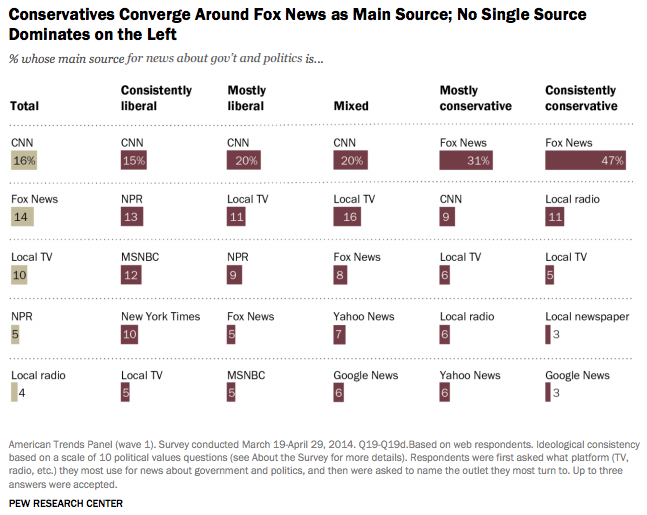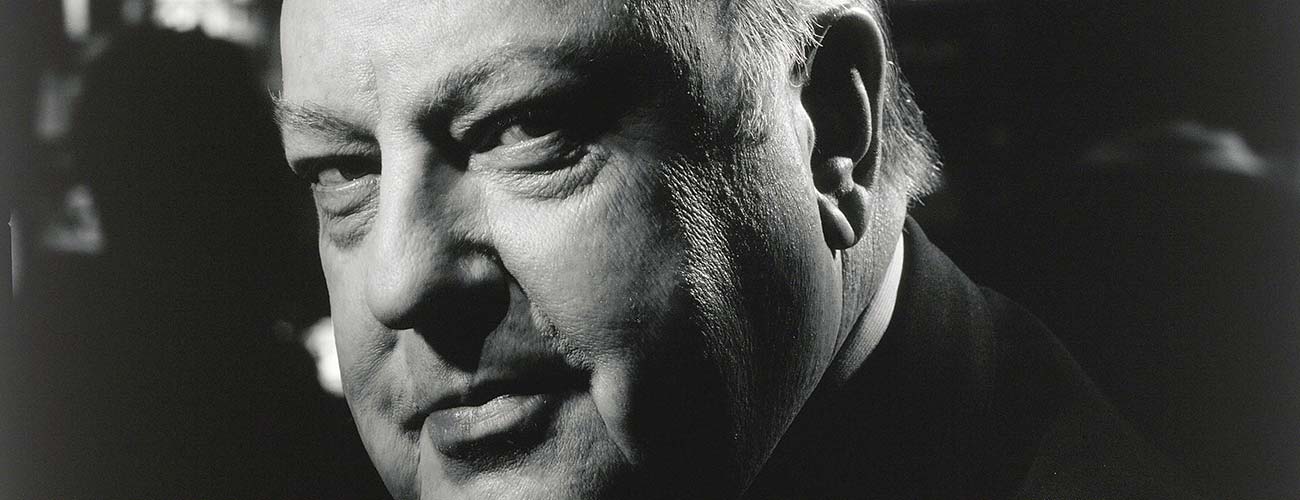In January 1996, when longtime GOP media consultant Roger Ailes was named chief executive of the soon-to-be-launched Fox News Channel, he claimed at a press conference that the network “would like to restore objectivity where we find it lacking.” Added Rupert Murdoch, the conservative media mogul who tapped Ailes to lead News Corp.’s foray into cable: “Frankly, all the [other TV news outlets] look alike. We will be an alternative.”
The implicit critique can be seen as a wink and a nod to what Ailes and Murdoch rightly foresaw as an untapped audience for conservative news and opinion programming. While highbrow publications like National Review had long been a voice for movement conservatism, few media organizations had attempted to take such worldviews mainstream. By the early 1990s, Rush Limbaugh opened the door for such efforts by attracting millions of listeners with his blend of smash-mouth conservatism and off-color humor. Fox’s launch was the next domino to fall in what would become a two-decade-long revolution in conservative media.
Fox cemented itself as a cable ratings winner and rightwing colossus in the post-9/11 world, beating out competitors offering both straight news and analysis and openly liberal programming. Limbaugh and countless other conservative hosts continue to dominate talk radio today. The digital transition, meanwhile, has ushered in a diverse conservative media ecosystem online. In this new world of abundant options, Ailes’s Fox has played the role of lone superpower, driving discussion among right-of-center audiences and in turn the Republican Party.
“Now,” Limbaugh wrote in National Review in November, “there is a fierce competition for the hearts and minds of the American people, which the Left used to believe it owned.”
But the boss’s resignation last week in wake of widespread sexual harassment allegations raises new questions of how long Fox’s singular dominance of conservative media will last. While the network won’t lose its ratings or influence anytime soon, an aging audience presents a demographic timebomb, and viewing habits are trending away from television. The Republican Party is splintering into ideological factions, just as conservative media choice is greater than ever. All together, these factors highlight the potential for another sea change among increasingly balkanized conservative media.
“There has been a unified message out of Fox that we haven’t seen out of other attempts at conservative outlets,” says Dan Cassino, a Fairleigh Dickinson University professor who researched Fox’s reach for his recent book, Fox News and American Politics. “That’s the genius of Roger Ailes: figuring out what to talk about to keep [Republicans or conservatives] together.”

It’s perhaps fitting, then, that Ailes’s official departure came the same week that Donald Trump, destroyer of Republican worlds, officially accepted the GOP presidential nomination. Trump is a media organization in his own right, and his surreal White House run has revealed that there’s in fact very little holding Republicans and conservatives together.
There’s wide variation among conservative media’s stances toward Trump, though they share intense criticism of Hillary Clinton. During the tenure of President Barack Obama, Fox has likewise operated as a de facto opposition group despite slight variances in its hosts’ apparent political leanings. “If [Fox hosts] get President Hillary Clinton, you’ll see much more of the same,” Cassino says. “If [Fox hosts] get President Trump, it could be much harder for them to decide on and deliver a cohesive message.”
Any divergence among Fox’s immensely popular personalities could play a key role the direction American conservatism takes in the coming decade. Ailes hails from a long line of media activists who have largely shaped right-of-center thought and politics in the postwar era. As Nicole Hemmer recounts in her forthcoming book Messengers of the Right, this lineage began with intellectuals like William F. Buckley Jr., of National Review; Clarence Manion, who began The Manion Forum radio program; and the founders of conservative magazine Human Events. Together, such ideological media laid the groundwork for a political movement eventually brought to the mainstream by Barry Goldwater’s failed presidential run in 1964.
“By the time Ailes comes along, there’s already a generation of conservatives who are used to seeking out alternative sources of media,” says Hemmer, an assistant professor at the University of Virginia’s Miller Center. “The kind of media that these conservative activists developed are focused on ideas and ideology and didn’t necessarily have to grapple with the pragmatics of politics.”
The innovation Ailes and his contemporary Limbaugh pioneered was the blending of conservative ideology with tabloidesque humor. “In this second generation,” Hemmer adds, “they’re entertainers first and conservatives second. It makes them much more successful and profitable. And it also changes the nature of the media.”
It’s too early to tell if we’re on the cusp of a third generation. But the combination of Ailes’s departure, a transforming conservative media, and a possible Trump presidency doesn’t bode well for the status quo. If Fox’s own history is any indication, such political crossroads carry with them the potential for massive change within media markets. Fox first overtook CNN in primetime ratings in January 2002, months after it adopted a more hawkish editorial tone in response to the Sept. 11 attacks.
“One of the things that put them on the map was their drum beating [in the War on Terror], and the implication that you were unpatriotic if you asked questions,” says Jane Hall, an American University professor and former media reporter who frequently appeared on Fox News Watch, a now-discontinued media analysis program. “I think they heightened the pressure on other media.”
Such Clash-of-Civilizations themes blended naturally into the broader culture war during the Obama years: Fox’s mind-numbingly repetitive coverage of the “War on Christmas,” Trump’s birther crusade, and the New Black Panthers, for instance. History should not be kind to such jingoistic storylines, which have for years overshadowed the network’s straight-news reporting and occasionally compelling interviews or political debates.
The network’s well-established brand of resentment politics attracts a massive audience, which dominates that of CNN, MSNBC, and even non-news channels. But cable is not a growing medium. The median age among Fox’s primetime viewers was 68 last year, compared to 59 for CNN. The path ahead now seems less clear, particularly under a Trump presidency.
Much depends on who replaces the political messaging guru Ailes. While there is little financial incentive to pursue wholesale changes at Fox—it’s a cash cow—there have been reports of political disagreements between the elderly Murdoch, who installed Ailes two decades ago, and his two sons, who hold increasing power within the company.
New York magazine’s Gabriel Sherman, an Ailes biographer who broke news of the Fox chief’s ouster, wrote earlier this month that “it stands to reason the Murdoch children would have the leverage they need to push Ailes aside and install a less-right-wing chief.” Another longtime Ailes chronicler, Michael Wolff, reported Monday that son James Murdoch “speaks to colleagues and friends of maintaining a conservative-leaning network but one that is more responsible and nuanced.”
It’s hard to imagine what that might look like—especially given the GOP’s present estrangement from conservatism as we know it—or how that would affect Fox’s bottom line. Complicating matters further for the network, personalities such as Sean Hannity, Bill O’Reilly, and Megyn Kelly have become brands in and of themselves.
The same was true of Glenn Beck, an often-demagogic host who nurtured a massive audience at Fox only to depart and found The Blaze, a multiplatform media company, in 2012. The site drew nearly 9 million unique visitors in June, according to comScore, despite financial troubles.
Beck’s defection speaks to Fox’s broader challenge: Like other media institutions, it has begun a protracted and increasingly asymmetrical war for its audience’s attention. While outlets like The Blaze are unlikely to unseat Fox in the coming years, they could collectively chip away at its current and future audience by offering either an alternative brand of conservatism or alternative editorial products.
There are certainly plenty attempting it. Breitbart has ridden nationalist and conspiratorial rabble rousing en route to nearly 14 million monthly unique visitors to its website. Independent Journal Review, which seems to focus on creating shareable content over pushing a political agenda, has a slightly larger digital audience. The Washington Free Beacon and Daily Caller produce a blend of reporting, commentary, and satire—the latter’s balance of the three often being far more cringeworthy. The Federalist and Heat Street largely spit out rapid-fire think pieces. These all come in addition to well-established blogs and a handful of publications from the pre-Fox era that have grown their online audiences considerably. It remains to be seen whether talk radio can make the logical jump to the more digital-native-friendly arena of podcasting.
All of these entrants are short on reporting and long on opinion—not unlike Fox, though the “Fair & Balanced” network does boast a stable of strong journalists. A few newcomers add thoughtful discussion to ideological debates online; others embody some of uglier traits that Fox has sold so effectively over the past two decades. The exchange of conservative ideas and viewpoints has become more fragmented, and at times more outrageous, as a result.
Which individuals or outlets emerge in this new environment could play a leading role in redefining conservatism in the years after Trump un-defined it—for better or worse. In the meantime, with millions of TV viewers and 62 million monthly uniques on its website, Fox has an immense upper hand in driving discussion on the right side of the political spectrum. The question going forward is how long the network can maintain Ailes’s audience—his political coalition—in the more competitive market he helped create.
David Uberti is a writer in New York. He was previously a media reporter for Gizmodo Media Group and a staff writer for CJR. Follow him on Twitter @DavidUberti.

